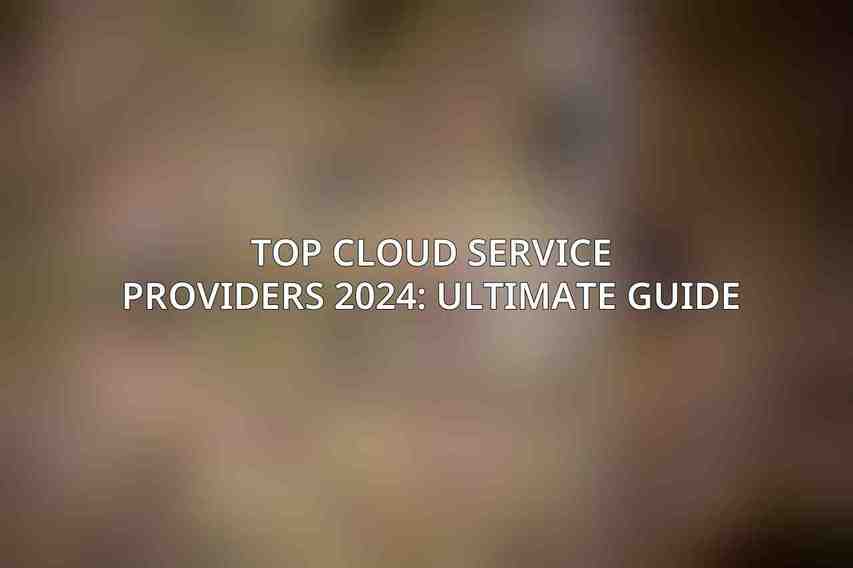Cloud computing has revolutionized the way businesses operate by providing on-demand access to computing resources over the internet. It allows organizations to scale resources as needed without the need for physical infrastructure. The benefits of cloud computing include cost savings, scalability, flexibility, and improved collaboration and efficiency among teams.
When choosing a cloud service provider, there are several key considerations to keep in mind. These include the provider’s reliability, security measures, compliance standards, flexibility of services, and pricing models. Understanding these factors will help businesses make informed decisions about which cloud provider best suits their needs. Dive deeper into Best Cloud Services for Small Businesses 2024: Efficient & Affordable
Top Cloud Service Providers
A. Amazon Web Services (AWS)
Amazon Web Services (AWS) stands out as the largest cloud provider, offering a wide range of services to companies of all sizes. Some key features of AWS include its robust computing services like EC2, Lambda, and Elastic Beanstalk, versatile storage options such as S3, EBS, and Glacier, extensive networking capabilities like VPC and Direct Connect, and a variety of database services including RDS, DynamoDB, and Redshift. AWS offers pay-as-you-go pricing and various pricing models to suit different business needs, along with 24/7 support, detailed documentation, and active community forums.
B. Microsoft Azure
Microsoft Azure is the second-largest cloud provider, known for its focus on enterprise solutions. Azure offers a range of computing services like Virtual Machines, Azure Functions, and App Service, storage options including Blob Storage and Azure Data Lake, networking solutions such as Virtual Networks and ExpressRoute, and various database services like SQL Server and Azure Cosmos DB. Just like AWS, Azure provides pay-as-you-go pricing, multiple pricing models, 24/7 support, thorough documentation, and Microsoft Premier Support for enterprise customers.
C. Google Cloud Platform (GCP)
Google Cloud Platform (GCP) leads in data analytics and artificial intelligence services. GCP features computing options like Compute Engine, Google Kubernetes Engine, and Cloud Functions, storage services such as Cloud Storage, BigQuery, and Cloud SQL, networking tools like VPC and Cloud VPN, and database offerings including CloudSQL, CloudSpanner, and Bigtable. GCP offers pay-as-you-go pricing, diverse pricing models, 24/7 support, comprehensive documentation, and Google Cloud Support.
D. Alibaba Cloud
Alibaba Cloud is a prominent cloud provider in Asia, focusing on security and serving a diverse range of customers. Its services include computing solutions like Elastic Compute Service and Function Compute, storage services such as Object Storage Service and NAS, networking tools like Virtual Private Cloud and Cloud Connect, and database services including Alibaba Cloud Database for MySQL, PostgreSQL, and Redis. Alibaba Cloud offers pay-as-you-go pricing, various pricing models, 24/7 support, detailed documentation, and an active Alibaba Cloud Community.
E. IBM Cloud
IBM Cloud is a longstanding cloud provider known for its emphasis on hybrid cloud solutions. IBM Cloud offers computing services like Virtual Servers, Kubernetes Service, and Cloud Functions, storage options including Cloud Object Storage, File Storage, and Block Storage, networking solutions like Virtual Private Cloud and Direct Connect, and database services such as IBM DBaaS for PostgreSQL, MongoDB, and Redis. Similar to other providers, IBM Cloud offers pay-as-you-go pricing, multiple pricing models, 24/7 support, comprehensive documentation, and IBM Cloud Support.
Comparison of Key Features

A. Computing
When comparing the computing capabilities of the top cloud providers, businesses should consider the types of instances offered, the pricing models available, and the scalability options provided by each provider. AWS, Azure, GCP, Alibaba Cloud, and IBM Cloud each offer a range of computing services tailored to different business needs.
B. Storage
Storage is a critical aspect of cloud services, with businesses needing to consider the types of storage offered, performance levels, and data protection features provided by the cloud providers. AWS, Azure, GCP, Alibaba Cloud, and IBM Cloud all offer various storage solutions designed to meet different requirements.
C. Networking
Networking capabilities play a crucial role in connecting cloud resources and ensuring secure and efficient communication. Businesses evaluating cloud providers should assess network connectivity options, security measures, and performance scalability features offered by each provider. Check this blog on Cloud Service Security 2024: What Providers Offer the Best Protection? Find more on Choosing a Cloud Service Provider: A Step-by-Step Guide 2024
D. Database
Databases are fundamental to many business operations, and cloud providers offer different database services to support varied workloads. Factors to consider when comparing database services include the supported database types, performance and scalability features, as well as security and reliability measures implemented by the cloud providers.
Pricing and Cost Optimization
A. Pricing models and options
Cloud service pricing can vary based on usage, services utilized, and additional features required. Understanding the pricing models and options offered by AWS, Azure, GCP, Alibaba Cloud, and IBM Cloud can help businesses optimize costs and choose the most cost-effective solutions for their needs.
B. Cost optimization strategies
To manage and reduce cloud costs, businesses can implement various strategies such as rightsizing instances to match actual resource requirements, leveraging managed services for increased efficiency, and utilizing features like spot instances and auto scaling to optimize spending while maintaining performance levels.
Support and Customer Service

A. Support channels and responsiveness
Cloud providers offer different support channels, including technical assistance, documentation, and forums. Assessing the support options and responsiveness of AWS, Azure, GCP, Alibaba Cloud, and IBM Cloud can help businesses address issues promptly and maximize the value of their cloud services.
B. Technical documentation and resources
Comprehensive technical documentation and resources provided by cloud providers are essential for users to troubleshoot problems, learn about new services, and optimize their cloud deployments. Access to detailed guides and resources can enhance the user experience and support efficient cloud utilization.
C. Community and user forums
Community and user forums offer platforms for cloud users to exchange knowledge, share best practices, and seek advice from peers and experts. Active community engagement can provide valuable insights, foster collaboration, and enhance the overall user experience with cloud services.
Future Trends in Cloud Computing
A. Serverless computing
Serverless computing, an innovative cloud service model, allows developers to focus on writing code without managing underlying infrastructure. This trend is gaining momentum as businesses seek more efficient and scalable solutions for their applications.
B. Artificial intelligence and machine learning
Artificial intelligence (AI) and machine learning (ML) are transforming various industries by enabling data-driven insights, automation, and personalized experiences. Cloud providers are integrating AI and ML services into their offerings to empower businesses with advanced capabilities.
C. Edge computing
Edge computing, which involves processing data closer to the source of input rather than in centralized data centers, is increasingly important for applications requiring real-time processing and reduced latency. Cloud providers are expanding their edge computing capabilities to support diverse use cases and enhance performance. Read more about this on Cloud Storage Solutions 2024: Reviews & Comparison
A. Recommendations for choosing the right cloud provider
Selecting the right cloud provider involves evaluating specific business requirements, considering factors like service offerings, pricing structures, support options, and future scalability. By conducting a thorough analysis and matching needs to available cloud services, businesses can make informed decisions that align with their goals.
B. Summary of key findings
We explored the key features, pricing models, support services, and future trends offered by leading providers like AWS, Azure, GCP, Alibaba Cloud, and IBM Cloud. Understanding the nuances of each provider can help businesses navigate the complex world of cloud computing and leverage the right solutions for their digital transformation journey.
Frequently Asked Questions
What are some of the top cloud service providers for 2024?
Some of the top cloud service providers for 2024 include Amazon Web Services (AWS), Microsoft Azure, Google Cloud Platform, IBM Cloud, and Oracle Cloud.
How can I choose the best cloud service provider for my needs?
To choose the best cloud service provider for your needs, consider factors such as pricing, performance, security, availability, and scalability. It’s also important to assess your specific requirements and compare them with the offerings of different providers.
What are some key features to look for in a cloud service provider?
Some key features to look for in a cloud service provider include robust security measures, high availability, scalability, reliable performance, flexible pricing options, and a wide range of services and tools.
What are the benefits of using cloud service providers?
Some of the benefits of using cloud service providers include cost savings, improved scalability and flexibility, enhanced security, increased collaboration and accessibility, and simplified management and maintenance of IT systems.
How can I stay up-to-date on the latest developments in cloud services?
To stay up-to-date on the latest developments in cloud services, consider subscribing to industry publications, attending conferences and webinars, following relevant blogs and social media accounts, and actively participating in online forums and communities dedicated to cloud computing.

